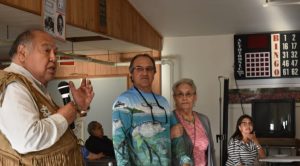Online Stock Enrollment and Automatic Elder Benefits
SEALASKA STOCK ENROLLMENT PROCESS IS 100% ONLINE
The enrollment process was recently simplified, eliminating notarization requirements. Applicants can now take a picture and upload supporting documents on the MySealaska.com online application. Supporting documents include birth certificate, Certificate of Indian Blood, and potentially parents’ or grandparents’ birth certificates. You may be required to send additional documentation if you have had a name change or were adopted.
When Sealaska was established under the Alaska Native Claims Settlement Act (ANCSA), 15,782 people enrolled and are often called “original” shareholders. Each original shareholder received 100 shares of class “A”, “B” or “C” stock. Sealaska also has a perpetual enrollment for life estate stock (class “D” and “L”). Enrollment can occur any time of the year.
For more about online enrollment visit www.MySealaska.com.
OPTING IN FOR ELDER BENEFITS NOW AUTOMATIC
Sealaska shareholders who turn 65 will be automatically enrolled for Elder benefits. As a result, if you are eligible, shareholders will receive the benefits unless they “opt-out”. There are two elder benefits, a shareholder may qualify for, including a one-time payment from the Elders settlement trust, and the issuance of an additional 100 shares of Class “E” stock.
1. One-time Payment from the Elders Settlement Trust
Sealaska shareholders who hold Class “A”,”B” or “C” stock receive a one-time payment from the Trust when they turn 65. The one-time payment includes $20 per share, based on original shares owned on November 2, 1991. The payment will be made via direct deposit or mailed check, depending on how you choose to receive payments from Sealaska.
2. Issuance of 100 Shares of Class E Stock
The non-voting shares are in addition to any original Sealaska shares they currently own. Class “E” shares are life estate stock and cease to exist upon the death of the shareholder. *Please note, in the 2019 Winter newsletter, it was reported that the additional class E shares are voting, which is incorrect.
*Please note, in the 2019 Winter newsletter, it was reported that the additional class E shares are voting, which is incorrect.










 Previous
Previous